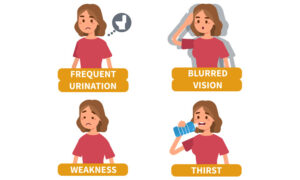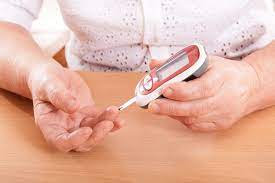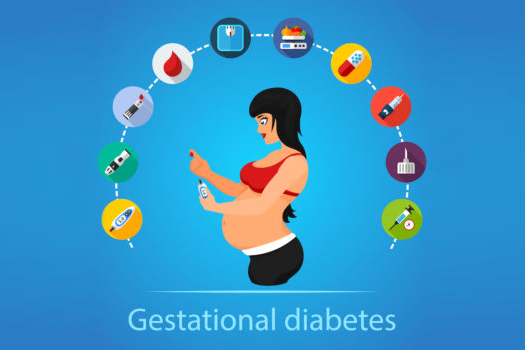Contents
Gestational Diabetes
Diabetes that develops during pregnancy is known as gestational diabetes. A pregnant woman can take treatment to lower her risk of gestational diabetes. Sometimes it is not possible to avoid it. In some cases, both the mother and the fetus might suffer from gestational diabetes.
The following are some of the possible outcomes:

- The rise in the blood pressure of the woman
- Greater chance of preeclampsia
- Higher risk of the mother acquiring type 2 diabetes later in life
- Higher risk of increases in birth weight for the baby
- An early birth for the baby
- A newborn with low blood sugar levels at the time of delivery
Diabetes diagnosed for the first time during pregnancy is known as gestational diabetes (gestation). This type of diabetes affects how your cells use sugar (glucose). It causes high blood sugar (hyperglycemia) which can harm your pregnancy and your baby’s health. Pregnant women can control gestational diabetes by consuming healthy meals, exercising, and taking medication if necessary.
Blood sugar control can help you and your baby stay healthy and avoid a traumatic birth. Blood sugar levels in women with gestational diabetes normally return to normal shortly after birth. However, if you’ve had gestational diabetes, you’re more likely to develop type 2 diabetes. In that case, these levels will need to be checked more frequently.
Symptoms Of Gestational Diabetes
Gestational diabetes usually has fewer symptoms. If you do experience symptoms, then it can be as:

- Fatigue
- Nausea and vomiting
- Weight loss with an increase in appetite
- Blurred vision
- Increase in urination
- Yeast functioning
- Increase in thirst
Yet, for many pregnant women, gestational diabetes manifests itself in the absence of its symptoms. According to the experts, all pregnant women should get a screening test for the disorder.
Causes Of Gestational Diabetes
Gestational diabetes is hypothesized to develop as a result of numerous hormonal and non-hormonal changes. It occurs in the body during pregnancy, which predisposes certain women to become insulin resistant. Insulin is a hormone produced in the pancreas by specialized cells that allow the body to effectively digest glucose for later use as fuel (energy). Blood glucose levels rise when insulin levels are low or when the body is unable to utilize insulin effectively (i.e., insulin resistance).
Risks/Complications Of Gestational Diabetes

Gestational diabetes is more common in some women. The following are some of the risk factors for gestational diabetes:
- Obesity and being overweight.
- There is a deficiency in physical exercise.
- Diabetes during pregnancy or prediabetes.
- Polycystic ovarian syndrome (PCOS) is a kind of polycystic ovary syndrome
- Family history of diabetes.
- Having delivered a baby weighing more than 9 pounds in the past (4.1 kilograms).
Moreover, Hispanic women, American Indian women, and Asian American women are more likely to acquire gestational diabetes.
Diagnosis Of Gestational Diabetes

If you’re at average risk for gestational diabetes, you’ll most likely have a screening test between 24 and 28 weeks of pregnancy. If you have a high risk of diabetes, such as if you were overweight or obese before pregnancy or if you have a diabetic mother, father, brother, or child, your doctor may test for diabetes early in the pregnancy. Most commonly at your first prenatal visit.
Routine Screening For Gestational Diabetes
Screening tests may differ slightly based on your health care practitioner, but they typically comprise the following:
Initial Glucose Challenge Test: You’ll be given a syrupy glucose solution to consume. You’ll undergo a blood test an hour later to determine your blood sugar level. Gestational diabetes can be of the blood sugar level of 190 milligrams per deciliter (mg/dL) or 10.6 millimoles per liter (mmol/L). On a glucose challenge test, a blood sugar level of less than 140 mg/dL (7.8 mmol/L) is usually considered normal. If your blood sugar level is higher than normal, you’ll need to do another glucose tolerance test to see if you have diabetes.
Follow-up Glucose Tolerance Test: This test is similar to the first, except that your doctor will measure your blood sugar after every hour for three hours. The sweet solution will include much more sugar that will be provided to you for the test purpose. Your doctor will advise you for gestational diabetes treatment if at least two of your blood sugar levels are higher than expected.
Treatment For Gestational Diabetes
There are three main treatments for gestational diabetes. These are:
- Lifestyle changes
- Blood sugar monitoring
- Medication (if required)
Keeping your blood sugar levels under control is important for both you and your baby’s health. Close supervision can also aid in the prevention of difficulties throughout pregnancy and delivery.
Lifestyle Changes

Maintaining a healthy blood sugar level requires a healthy lifestyle. It includes how you eat and how much you are active. During pregnancy, doctors advise not to lose weight because your body is working overtime to support your growing kid. He will help you to set weight gain objectives depending on your pre-pregnancy weight. The following points you can include in lifestyle changes.
- Healthy Diet: A healthy diet emphasizes fruits, vegetables, whole grains, and lean protein. Also, foods are high in nutrition and fiber while being low in fat and calories. You should avoid overly refined carbs, such as sweets. A dietitian or a diabetes educator can help you create a meal plan based on your current weight, pregnancy weight gain goals, blood sugar level, exercise habits, food preferences, and budget.
- Stay Active: Before, during, and after pregnancy, every woman’s fitness plan should include regular physical activity. Regular exercise can help ease several typical pregnant discomforts, such as back pain, muscle cramps, swelling, constipation, and difficulty in sleeping. Moreover, it lowers your blood sugar levels.
If your doctor is satisfied with your health, then aim for 30 minutes of moderate exercise on most days of the week. If you haven’t been active for a while, start slowly and build up gradually. Walking, cycling and swimming are good choices during pregnancy. You can also count everyday activities such as housework and gardening.
Blood Sugar Monitoring

For gestational diabetes treatment, your doctor will also advise you for regular blood sugar monitoring. This monitoring includes:
- Close monitoring of your baby: Close monitoring of your infant is a vital element of your treatment approach. Your doctor will use ultrasounds or other tests to monitor your baby’s growth and development. Your doctor may induce labor if you don’t go into labor by your due date or sometimes much earlier. If you deliver after your due date, you and your baby are at a higher risk of difficulties.
- Follow-up after delivery: Your blood sugar will be checked after delivery and again in six to twelve weeks to ensure that it has returned to normal. If your tests are normal, which they usually are, you’ll need to have your diabetes risk reviewed every three years at the very least. If future tests reveal that you have type 2 diabetes or pre-diabetes, talk to your doctor about stepping up your preventative efforts or beginning a diabetes management plan.
Medication

If diet and exercise aren’t enough to control your blood sugar, then it requires insulin injections. Between 10% and 20% of women with gestational diabetes use insulin to achieve their blood sugar targets. Some doctors recommend oral medication to regulate blood sugar. Moreover, others believe that additional study is needed to prove that oral medications are as safe and effective as injectable insulin for gestational diabetes treatment.
Prevention For Gestational Diabetes
Although gestational diabetes treatment cannot always be avoided. There are several precautions that women can take to help lower their risks of having it.
Managing Pregnancy At Healthy Weight

Before becoming pregnant, a woman who wants to conceive should make lifestyle choices that will help her reach and maintain a healthy weight. People who want to reduce weight can make changes to their diet by doing things like:
- Dividing food into smaller portions.
- Eating more lean protein, such as fish and tofu, to remain fuller for longer.
- Increasing fiber intake by eating plenty of vegetables and whole grains.
- Avoiding packaged food and “junk food”.
- Replacing candy with fruit for more protein.
Exercise

There is nothing bad in doing low-intensity physical exercises, even if you are fit and healthy. Maintaining a healthy weight necessitates regular exercise. Exercise can help you avoid gestational diabetes both before and during pregnancy. Exercise makes the body more responsive to the insulin produced by the pancreas. It also controls blood sugar levels in the body.
Steps that may help anyone who has a sedentary lifestyle include:
- Taking the stairs.
- Doing active leisure activities, such as gardening, or playing with children outdoors.
- Trying yoga, ideally a class specifically for pregnant women or beginners.
- Doing low-impact exercise, such as walking.
- To keep motivated, join a fitness group.
Eating Well
Preventing gestational diabetes and ensuring that a woman only gains a healthy amount of weight during each trimester can both be accomplished by eating appropriately. You need to choose healthy food and avoid worse foods. The list below includes healthy foods and foods that need to be avoided.
Healthy Food:

- Beans
- Fish
- Tofu
- White poultry
- Nuts
- Olive oil
- Coconut oil
- Brown rice
- Oatmeal
- Bread
- Greek yogurt
- Non-starchy vegetables
- Fruits
Food that needs to avoid:
- Processed food
- Coffee drinks or energy drinks
- Juices and sodas
- Extra or added sugar foods
Attend Routine Care Appointment

During pregnancy, a woman should see a gynecologist for routine treatment. The doctor will inquire about the pregnancy and any new symptoms throughout these appointments. They’ll also perform a pelvic exam and examine the developing fetus with an ultrasound.
Some of the early indicators of gestational diabetes may be recognized by a doctor. He will ask you for gestational diabetes treatment or propose some strategies to help in preventing it. A pregnant lady will get a gestational diabetes screening between the ages of 24 and 28 weeks. If the results show that she has gestational diabetes, the doctor will discuss ways to avoid further difficulties.
Conclusion
In the above article, you got to know about gestational diabetes as well as its treatment. Hence, you get an idea of what precautions you need to while having gestational diabetes. Also when to consult your doctor. And what all are its symptoms, causes, and risk factors.
Do you want to get rid of diabetes? Join our online diabetes consultation program and reverse your Diabetes naturally through lifestyle changes such as a Personalized Diet plan, Exercise, dieticians, and health coaches.


